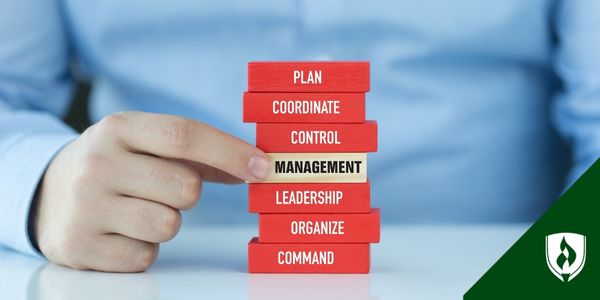
Twelve years after high school, Layla had built a strong career. She worked her way up from server to assistant manager at a national restaurant chain. She helped open new stores, trained staff, and even helped test the company’s first mobile ordering app. Her coworkers saw her as a strong leader and a top performer. But when a district manager role opened, Layla was passed over for someone with a college degree.
Does this sound familiar?
Most of us are all too aware of how experience can be skipped over in favor of a formal education. But what many don’t realize is just how useful your experience can be when you apply it inside a formal education.
If you have business experience or if you’ve spent real time working in retail, you have a better understanding of many foundational business principles (not to mention skills) than someone who hasn’t had your work history.
That understanding can truly shine when you turn in your first college assignment. At Rasmussen, we use real-life scenarios as the basis for projects and assignments in the business program for this exact reason. Many of our students have excellent experience already under their belts.
What is retail management?
Retail management is the process of running day-to-day retail operations in a way that keeps customers happy and businesses successful. It includes everything from choosing products to managing staff and creating a smooth shopping experience.
People often picture store managers when they think of retail, but retail management is much broader. It plays a key role across the retail industry, from small local shops to large ecommerce stores. Whether helping a customer in person or designing a mobile app for online orders, retail managers shape the customer experience at every step.
In today’s fast-paced market, strong retail store and online operations are key. That means knowing how to track sales, manage inventory, train teams and stay ahead of customer needs—both in store and online.
What does retail management look like in real life?
Retail managers work in many settings, from busy storefronts to behind-the-scenes tech teams. Their daily tasks can vary depending on the type of retail business and customer needs.
Wherever they work, retail managers will likely spend time on...
- Strategic retail promotion
- Financial management
- Researching market trends
- Marketing management
- And overall retail strategy
Let’s say Adam works as a retail manager in a resort gift shop. Every Friday, he reviews sales trends and places orders based on what products are selling well. He meets with team members often and uses their feedback to decide which items should go near the register.
When cashiers or team members offer suggestions for retail innovation, like bringing in frequently requested items or changing the shop layout, Adam pairs their ideas with his own market research and understanding of consumer behavior.
Because of this, Adam is working on a way for guests to order gifts from their rooms and have them delivered.
In a different retail environment, Keisha manages ecommerce operations for an online shoe store. She tracks inventory and makes sure the website always shows what’s in stock. When customers had issues placing orders on mobile devices, she led a full redesign of the site. Keisha also created a team focused on reducing cart abandonment and improving customer satisfaction.
These examples show how retail operations can involve both in-store and digital systems. Managers like Adam and Keisha use data, creativity and leadership to create smooth experiences for their customers.
Retail management versus business administration
There’s overlap between retail management and business administration, but they are not the same roles.
A retail business focuses on direct interaction with customers and fast-paced daily operations, while business administration takes a broader view of planning and finances across different departments.
Marketing, finance, and HR are common in both, but retail management centers on strategies that improve the customer experience and increase customer satisfaction. Retail managers are hands-on leaders who respond to real-time challenges, from inventory issues to staff training and customer service needs.
What you learn in a retail management program
A retail management degree teaches students how to lead in a fast-paced, consumer-facing world. Programs combine foundational business knowledge with hands-on learning in sales, strategy, and digital tools. Here's what you can expect to learn.
Digital and omnichannel retail
Today’s customers shop across devices, platforms, and locations. That’s why students learn to manage e-commerce platforms, implement retail technology and build digital marketing strategies that support seamless customer experiences. Courses may cover how to optimize a brand’s mobile presence, launch online stores, and connect in-store and online systems for curbside pickup or home delivery.
Communication and customer service training
Retail managers must know how to build trust with customers and lead teams with confidence. Programs teach customer service training techniques like active listening, conflict resolution, and how to respond to negative reviews.
Students also explore customer relationship management (CRM) tools that help track feedback and improve loyalty. These communication skills are vital for managing both customers and employees.
Data, sales trends and strategic thinking
Retail success relies on smart decisions informed by data. Students learn to analyze sales trends, track market research and use data analytics to forecast demand. You’ll also study pricing strategies and performance metrics that shape how products are stocked, promoted, and sold.
These skills prepare you to set goals, solve problems and think ahead.
For more on that, check out 5 Factors That Influence Consumer Behavior.
Supply chain and inventory management
Getting products from the supplier to the shelf takes planning. Retail management programs dive into supply chain management, including logistics, vendor relationships and distribution channels.
Students also learn inventory management strategies that prevent overstock or sellouts and study how chain management impacts store performance and customer satisfaction.
If this interests you, check out What Can You Do With a Supply Chain Management Degree? 8 Careers to Consider.
Careers in retail management
A retail management degree opens doors to a wide range of jobs in the retail sector, from traditional department stores to fast-growing ecommerce companies. Whether you're interested in leading a team, designing store layouts or analyzing trends, there’s a role for every skill set.1
Diverse roles in the retail world
Maybe you will find a role in visual merchandising, where you can use color theory, layout planning and trend forecasting to design store displays that boost customer engagement.
Maybe you’ll pursue a role as a brand manager and oversee marketing strategy, product positioning and campaign coordination.
These are just two of many paths. With a background in retail management, you might work as...
- A store manager or retail manager, leading a team and ensuring smooth daily retail operations
- A merchandiser, selecting and sourcing the right products for your target audience
- A marketing manager, driving brand awareness and boosting sales through digital and in-store promotions
- An ecommerce analyst, using data to improve online experiences and drive conversions
Each of these roles plays a key part in shaping the customer experience, whether it's online, in person or both.
Is a retail management major right for you?
If you’re thinking about studying retail management, start by asking yourself a few key questions.
- Do you enjoy fast-paced environments and solving problems on the fly?
- Are you interested in how products move from idea to shelf—or screen?
- Do you want to build specialized skills in customer engagement, sales and marketing?
- Would you like a career where real world experience is just as important as classroom learning?
Retail management might be a strong fit if you’re looking to develop skills in leadership, strategy and communication that can transfer across many industries. It’s a major for people who like variety, enjoy working with others and want to see the direct impact of their work.
Whether you're drawn to big-picture planning or on-the-ground operations, the field offers room to grow, adapt and apply what you learn in meaningful ways.
Your next step into retail management
Whether you are interested in analyzing sales trends, mentoring new team members or creating better customer experiences, a business degree can help open your options.
What’s your next move? What’s your goal? And most importantly, what’s stopping you?
Retail is always changing. That’s part of what makes it exciting. If you want to be part of an industry that values creativity, strategy and leadership, retail management could be the path for you. Whether your goal is to lead a team, launch a new product or grow a retail business, the skills you gain can open doors in a fast-moving field full of opportunity.
Check out The Beginner's Guide to Different Types of Business Degrees to see which options would work best for what you need.
1Rasmussen University does not offer any programs in Retail Management. Rasmussen University’s Business Management Associate’s and Business Management Bachelor’s degree programs do not have the option to specialize in Retail Management.




